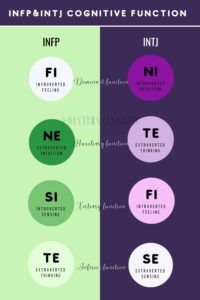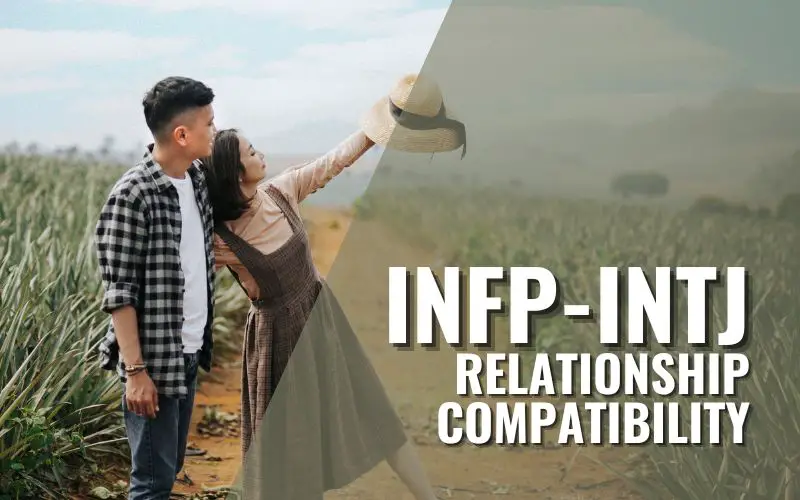Honest, intense, and quiet. These adjectives describe the polarizing dynamics of an INFP and INTJ relationship.
At first glance, these two introverts seem to be on the opposite end of the introvert spectrum since INTJs are more logical, while INFPs are more free-spirited. However, as the saying goes, opposites attract.
Half of the INTJs’ and INFPs’ cognitive functions are identical, and the other two are complementary, which means they have more similarities than other introverted personalities.
What exactly are their cognitive similarities? Do INFPs and INTJs get along? How compatible are they in a relationship?
Let’s talk about it.
Do INFPs and INTJs get along?
As we traverse through INFP and INTJ compatibility, you can look at the image below as a reference to their cognitive functions.

INFPs and INTJs’ extraverted Thinking (Te) are responsible for their logical thinking, love for collective data, and research.
As a high Te user, INTJs are like walking libraries. They love to share with people their in-depth knowledge — may it be technical or philosophical — backed by credible resources.
Meanwhile, INFPs, who have Te also share a passion for learning concepts. But being a Te inferior, there’s no wonder INFPs look up to INTJs as their main sources of knowledge, too.
Both are curious and voracious readers and seekers.
Additionally, INFPs and INTJs also have introverted Feeling (Fi) in their primary stack, so both uphold a sense of moral values system. However, despite carrying personal values, they rarely clash about morals because INTJs, as Thinkers, are quick to give way to their INFPs’ strong convictions (and even mood swings).
In addition, as high Fi users, INFP can help INTJs (Fi at the 3rd cognitive spot) interpret emotions and the wisdom in understanding other people.
So do INFPs and INTJs get along?
Having their moral compass and curiosity for truth, INTJs and INFPs get along well as friends or romantic partners. Intellectually, they appreciate each other’s knowledge, wisdom, and relentless curiosity. Emotionally, INFPs and INTJs love each other’s truthfulness and loyalty.
The Strengths of the INFP-INTJ Relationship
1. INFPs and INTJs are extremely loyal.
INTJ and INFPs do not easily trust people. But when they do, they give their hundred percent loyalty.
As empaths, INFP loyalty is about building trust with someone and not sharing the same emotional connection or exclusivity with just anyone.
On the other hand, INTJs see loyalty as respect. If an INTJ respects you, they will stick with you through thick and thin.
Both have low tendencies to cheat on their partners. While there may be arguments here and there, this partnership values commitment and is less likely to go against their morals.
2. Both INFPs and INTJs are intellectually curious.
INFPs are intellectually curious about humanity, ranging from the experiences to emotions people have. Meanwhile, INTJs are curious about everything! They love learning regardless if it’s a new philosophical, scientific, political, or strange fact.
INTJs’ need for an intellectual equal makes INFPs attractive to them. Since INFPs can catch up with all INTJs’ curiosities—which other non-intuitive personalities can’t—they can have mind-boggling discourse all day.
3. INFPs give INTJs a safe space to express their emotions.
INFPs are more aware of their emotions when compared with INTJs.
Dealing with emotions is uncomfortable for INTJs since they’re more accustomed to using their logic. For example, INTJs would rather dwell on what they can do to move forward than what they currently feel when dealing with a breakup.
But with INFPs’ concern and empathy over emotions, INTJs get to process their feelings with INFPs’ help.
Having someone who can listen, understand, and validate your emotions comes with being with an INFP. So, as long as INTJs are with these empaths, they can freely be emotionally vulnerable.
4. Both INFPs and INTJs desire long-term commitments
Being in a relationship is one thing. But having the same goals and principles makes it ten times more compatible.
INFPs and INTJs believe that being in a relationship means investing in deep emotional bonds. And to invest such deep emotions should be long-term, as you are sharing a part of yourself with your person.
Most INFP-INTJ relationships are years-long because of this belief. Additionally, the more they get to know their partner, the less these introverts become jealous as they become more secure individually and romantically.
The Struggles of the INFP-INTJ Relationship
1. INTJs favor logic, while INFPs dwell on emotions.
INTJs rely heavily on facts and how these facts solve a problem. On the other hand, INFPs internalize their emotions to help them make a judgment according to their morals.
Whenever INTJs and INFPs have a conflict, INTJs immediately rely on the facts of the situation to make a rational decision. They often set aside what they and their partner feel to prioritize making a solution.
However, INFPs don’t always support this approach. For INFPs, we must pay equal attention to our emotions as we make a logical solution.
It’s a struggle for INTJs to follow what INFPs want, as logic has become their safety net for as long as they can remember. And their difficulty tapping into their emotions typically makes it frustrating for INFPs.
2. INTJs are extremely time-aware, INFPs tend to procrastinate.
An INTJ would agree that time is gold, so they calculate their work time from start to finish. Meanwhile, an INFP would argue that time is relative, so they work at their own pace. While both may be true, it is contrasting and causes these two personalities to frustrate each other.
INTJs like following a schedule with deadlines to reduce unwanted delays. Since they think delaying a task will only bring more burden than help, they would rather fix it now than later.
Meanwhile, INFPs have a different way of viewing time. For these empaths, time is more flexible. And so, they rarely force themselves to follow deadlines that will cause more stress than relief.
INTJs’ uptightness and INFPs’ procrastination cause these two to quarrel. For example, when going out on a date, INTJs would often wait for INFPs whose rushing to meet them late.
3. INTJs accept criticism constructively, while INFPs take it personally.
Since INFPs are more connected to their emotions than INTJs, they are also more vulnerable to taking criticisms personally.
Say, when an INTJ makes a correction on an INFP’s mistake, there would be instances where INFPs would feel offended by it. Not because they think they’re always right. But because they feel personally attacked by corrections.
And since INFPs’ Fi makes them internalize their emotions first before communicating, it leads to fights between the two.
INFP-INTJ Relationship Advice
1. Be patient. Chemistry and trust take time.
Since both INFPs and INTJs take a long time to become vulnerable, trust is earned rather than freely given.
Especially for INFPs and INTJs in their early stages of dating, the best way to build chemistry and trust is by being patient.
Trust goes beyond telling the truth for personalities such as these two introverts. It is a connection.
Additionally, learn to compromise your habits. But not your beliefs. As both personalities have firm moral systems, they must balance compromising what will make their relationship stronger and respecting their personal beliefs.
2. INTJs must learn to criticize with sensitivity. INFPs must accept criticism with an open mind.
INTJs tend to disregard their friends’ emotions to tell the truth. And although their intent is harmless, they cannot continue such a habit with their INFP partners.
INFPs are emotionally sensitive. And it takes a lot of practice to unlearn being overly sensitive. To continue being in a relationship with INTJs, they must learn to view criticism as a helpful comment rather than judgment.
For INTJs, there is no exact recipe to prevent saying hurtful truths. And for INFPs, it’s also difficult to completely shut off being emotionally sensitive. But what they can do is communicate what is offensive, acceptable, and tolerable for them.
Conclusion
The question ‘why are INTJs attracted to INFPs?’ can be answered in three words: principles, respect, and understanding.
As INTJs and INFPs have the same principles yet different perspectives, their relationship heavily relies on respect to understanding their differences.
Overall, INFPs and INTJs can be compatible in relationships. They have numerous similarities. But also a few differences. They must put extra effort into communicating their boundaries to make their relationship work.
You may also like:
- INFP Jealousy: Are They Possessive Partners?
- 9 Ways To Take Care Of Your INFP Partner
- 5 Ways INFP Can Find Love (When They’re Ready)

